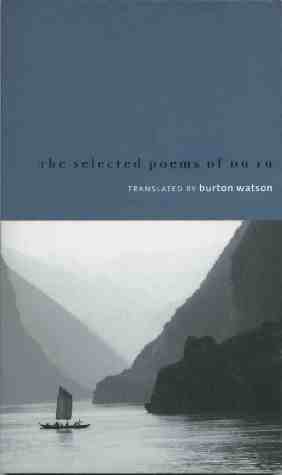Buy from Amazon.com

Burton Watson's collection of Du Fu translations presents 135 poems, including most of the poet's best-known poems. They are presented in chronological order, each with notes on the circumstances of its composition and explanatory footnotes where necessary. Each poem has a page to itself, although the notes and numbering are sometimes intrusive aesthetically.
The poems are preceded by a chronology and an introduction sketching Du Fu's life and identifying the main characteristics of his works: there are no particularly penetrating insights on offer here, but this is a useful summary for those not yet familiar with him. Vitally, however, what the book lacks is any kind of indexing: there is no contents list for the poems, no title index and no index of first lines. Unless one knows the date of composition, therefore, there is no way of finding a particular poem short of flicking through the whole book.
The translations themselves steer a middle course between fidelity to the original and natural English: as an example, his translation of Chun Wang is as follows:
Spring Prospect
The nation shattered, mountains and river remain;
city in spring, grass and trees burgeoning.
Feeling the times, blossoms draw tears;
hating separation, birds alarm the heart.
Beacon fires three months in succession,
a letter from home worth ten thousand in gold.
White hairs, fewer for the scratching,
soon too few to hold a hairpin up.
The first notable touch is the title itself: the word "prospect" brings out the double meaning of the view in springtime and the prospects for the country. In the first line, Watson declines to clarify the relationship between the two parts of the line with a conjunction, but the translation of zai as "remain" economically achieves the same effect. "Shattered" and "burgeoning", however, seem unnecessary elaboration of Du Fu's simpler vocabulary.
The translation of the second couplet is confused and consequently confusing. The original Chinese is ambiguous as to whether it is an observer or (metaphorically) the flowers and birds which feel, weep, hate and are alarmed. Watson seems to attempt to replicate this ambiguity, but can only do so by conflating the two interpretations: the flowers and birds feel and hate respectively, but the observer weeps and is alarmed. It must be preferable to accept that the ambiguity, as so often in Chinese poetry, is untranslatable and to choose one interpretation for the translation.
This is in fact exactly what Watson does in line 5; the original text speaks of beacon fires as being "connected", but does not narrow this down to connection in either space or time. Again, this ambiguity cannot be replicated in English, and Watson this time opts to translate the temporal connection only.
In each of the last four lines, Watson follows the original in leaving out active verbs; the beacon fires, the letter and the hairs don't do anything. The danger with this approach is that it can come across as overly telegraphic and stilted in English; whether Watson's striking of the balance between fidelity and naturalness is acceptable must be for each reader to decide.
Buy from Amazon.com
